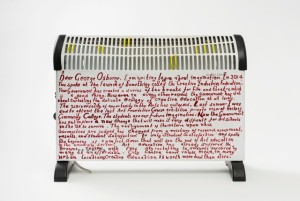You cannot help but wonder: did a 50-line letter painted onto the front and rear of a pair of white radiator units have any incidental effect on government policy? Did it really spark a heated debate?
Beyond the headlines about tax credits, the Autumn Statement revealed that the Arts Council can also breathe a sigh of relief and consider its budget protected for five more years.
This is not the beef raised by Smith, who talks tuition fees, the threat to art schools from property developers, and the culture of consumerism which now extends to the student experience.
None of this has changed. But the artist signs off with a message which may just be getting through: “I THINK THE ARTS ARE REALLY ABOUT SAVING HUMANITYâ€. What did Osborne think of that?
Certainly the arts are a cheap way to save humanity. Arts Council England cost £349 million in 2014; to save humanity with a replacement for Trident will cost, according to CND, some £100 billion.
There are dangers in cynicism, however. A positive and polite reaction to this news about the Arts Council could be more likely to encourage the Conservative government in this cultural direction.
But giving credit is not abject gratitude. As Smith says, in another set of emphatic capitals: “ART IS YOUR HUMAN RIGHTâ€. Just as education is a right, welfare is a right, and healthcare remains so.
As inhumane as austerity is proving to be, the left should remember we don’t have a monopoly on humanity. Again, appeals to this quality may prove more tractable than immediate class war.
That could be why Smith’s naivety, both in tone and execution of this open letter, strikes an effective chord. It treats the Chancellor as a reasonable human. It invites him to enjoy contemporary art.
But this is also is a bit of a joke. Smith is only an artist; he is not the head of a bank. The banker uses headed notepaper, and not beat-up used radiators. So to who does the future belong?

No Comments